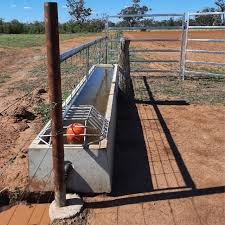If you're considering acquiring livestock as pets, for extra income, or as a hobby, there are several important factors to keep in mind. Proper planning and understanding of your responsibilities will ensure a rewarding experience.
Here’s a comprehensive checklist:
1. Appropriate Yards and Fencing
Space Requirements: Ensure you have sufficient land to accommodate the type and number of livestock you plan to keep. Research specific space needs for each animal.
Fencing: Invest in secure fencing that can withstand the specific livestock you are raising. Different animals require different types of fencing (e.g., electric fencing for goats, sturdy fencing for cattle).
Yard Design: Create separate areas for grazing, feeding, and shelter to minimise stress and maintain hygiene. Also reduces risk of injury to the animal and producer.
2. Water Supply
Fresh Water: Livestock require constant access to clean, fresh water. Ensure your water supply is reliable and can accommodate all animals. Having clean water also increases weight gain and animal health.
Water Source: Consider how you will provide water, whether through troughs, tanks, or natural sources. Regularly check for leaks or contamination. Ensure bores are tested to ensure palatable to livestock. Having clean water also increases weight gain and animal health.

3. Shelter
Protection from Elements: Provide adequate shelter to protect livestock from harsh weather conditions, such as extreme heat, cold, rain, or wind. Being exposed to weather can impact weight gain and animal health.
Ventilation and Space: Ensure shelters are well-ventilated and spacious enough for all animals to move comfortably. Always ensure you have a shade shelter if you do not have trees.
4. Animal Husbandry
Basic Care: Familiarise yourself with the nutritional, health, and social needs of the specific livestock you are considering. Including vaccinations and drenching to castration and dehorning.
Feed and Pastures: Plan your seasons and animal feed requirements. Don't overstock or overfeed paddocks.
Regular Health Checks: Implement a routine for health checks, vaccinations, and deworming. Establish a relationship with a veterinarian knowledgeable about livestock.
Handling and Training: Understand how to handle and train your animals to ensure their comfort and safety.
5. Legal Obligations
Registered Property Identification Code (PIC): Obtain a registered PIC for your property, which is necessary for tracking livestock and complying with biosecurity laws.
National Livestock Identification System (NLIS): Ensure you understand NLIS requirements, including movement transfers. It is your responsibility to complete these transfers when buying or selling livestock.
Livestock Production Assurance (LPA) Accreditation: If you plan to sell livestock, consider obtaining LPA accreditation. This program ensures that you meet industry standards for food safety and animal welfare.
6. Zoning Regulations
Local Laws: Check local council regulations regarding livestock ownership, including zoning laws that dictate what types of animals can be kept and how many.
Noise and Odor Regulations: Be aware of potential nuisance laws that may arise from noise, odour, or waste management associated with livestock.
7. Financial Considerations
Initial Costs: Budget for the initial purchase of livestock, fencing, shelter, feed, and veterinary care.
Ongoing Expenses: Account for ongoing costs such as feed, health care, and maintenance of facilities.
8. Time Commitment
Daily Care: Be prepared for the time commitment associated with feeding, grooming, and caring for your livestock.
Emergency Preparedness: Have a plan for emergencies, including veterinary care, natural disasters, and other unforeseen events.
9. Community Relations
Neighbour Considerations: Communicate with neighbours about your plans to keep livestock, particularly regarding noise, odours, and any potential concerns.
Community Resources: Engage with local farming communities for shared resources, advice, and support.
10. Conclusion
Owning livestock as pets or for supplementary income can be a fulfilling endeavour. However, it requires careful planning and adherence to various responsibilities. By understanding these factors, hobby farmers can create a safe, healthy environment for their animals while ensuring compliance with legal obligations and maintaining good community relations. Proper preparation will lead to a rewarding experience in livestock ownership.
Acknowledgement
This article is courtesy of Amanda Burchmann from Jab Agri Solutions.



